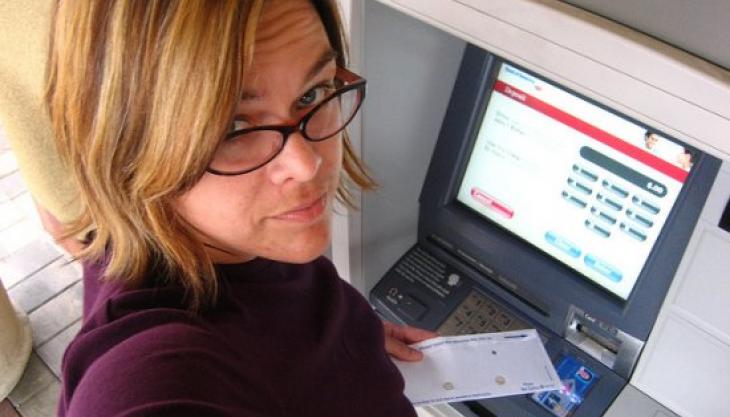How Are Joint Bank Accounts Affected by North Carolina Bankruptcy When Just One Person Files?
Submitted by Rachel R on Mon, 10/03/2016 - 10:09am

Be careful with a joint bank account.
Image Source: Flickr User Betsssssy
If you share a bank account with a significant other, spouse, friend, or family member, you should be aware that if one of you winds up deep in debt, all the funds in that account could be at risk. This is particularly serious if it comes down to a garnishment or bankruptcy filing. Here are some things you should know about joint bank accounts.
#1 Garnishments Don’t Differentiate Whose Money It is
In North Carolina, the law offers many protections to consumers including a ban on most wage garnishments. Unless you owe the IRS or child support/alimony, your wages are generally safe from garnishment. However, your bank account may not be as safe.
If a creditor sues you in the NC court system and gets a judgment for a debt, they can try and garnish funds in your bank account. If you share a bank account, the garnishment won’t respect whose funds they’re taking. If your name is on the garnishment and the account too, then it’s open season.
#2 Trustees Could Take It All in North Carolina Bankruptcy
If you have a joint bank account and are considering bankruptcy, it’s best to split up the money and open an individual account before you file. If your name is on the account, even if you didn’t earn it, the trustee could consider it your asset and thus available to your creditors.
In fact, if you’re deep in debt, splitting off and taking your name off any accounts you share is wise in case of lawsuit or bankruptcy. This draws a clear line in the sand of what’s your money and what is someone else’s so no one else ends up paying for your debt.
#3 Bank Offset is a Concern
Another banking concern is the “right of offset.” If you have a credit card or loan through the same financial institution where you bank, there may be some fine print in the credit agreement that allows the bank to take money from your account to satisfy debts.
In some cases, this even overrides bankruptcy petitions. If you have a joint or individual account at a bank where you have a credit card, auto loan, or mortgage, and you’re delinquent on payments, setting up new, individual accounts at a totally new bank could prevent your account from being drained.
#4 Blended Funds Risk Money that Should be Sheltered
In North Carolina, certain types of income are not considered “income” when calculating bankruptcy repayment plans for Chapter 13. Social security payments, for example, are excluded. However, if your SSI payments are direct deposited with non-exempt income, it can complicate matters.
This can make it difficult to distinguish which funds are yours, which belong to your joint account holder, and which are eligible for your creditors to access. It’s best to segregate social security income into an account of its own with no other funds coming in and which only you can access.
Find Out More About North Carolina Bankruptcy
If you’re deep in debt and need significant relief, North Carolina bankruptcy may be a solution for you. But before you file, it pays to do some prep work, including splitting up joint bank accounts to protect others’ income from your debt.
In fact, even if you’ve already been garnished, filing NC bankruptcy within a certain time frame after the money is taken could help get the funds returned to you. Contact the Law Offices of John T. Orcutt today to discuss the benefits of North Carolina bankruptcy.
Call +1-833-627-0115 now for a free NC bankruptcy and debt relief consultation at one of our convenient locations in Raleigh, Durham, Fayetteville, Wilson, Greensboro or Wilmington.
Debts Hurt! Got debt? Need help? Get started below!
Serving All of North Carolina
- Bankruptcy Attorneys Raleigh NC (North)
- Bankruptcy Attorney Fayetteville NC
- Bankruptcy Attorney Durham NC
- Bankruptcy Attorneys Wilson NC
- Bankruptcy Attorneys Greensboro NC
- Bankruptcy Attorneys Southport NC
- Bankruptcy Attorneys Wilmington NC
Bankruptcy Attorneys Raleigh NC (North)
6616 Six Forks Rd #203 Raleigh, NC 27615 North Carolina
Tel: (919) 847-9750

Bankruptcy Attorney Fayetteville NC
2711 Breezewood Ave Fayetteville, NC 28303 North Carolina
Tel: (910) 323-2972

Bankruptcy Attorney Durham NC
1738 Hillandale Rd Suite D Durham, NC 27705 North Carolina
Tel: (919) 286-1695


Bankruptcy Attorneys Greensboro NC
2100 W Cornwallis Dr. STE O Greensboro, NC 27408 North Carolina
Tel: (336) 542-5993

Bankruptcy Attorneys Southport NC
116 N Howe St. Suite A Southport, NC 28461 North Carolina
Tel: (910) 218-8682

Bankruptcy Attorneys Wilmington NC
116 N. Howe Street, Suite A Southport, NC 28461 North Carolina
Tel: (910) 447-2987
